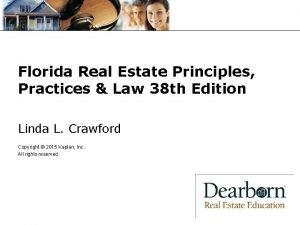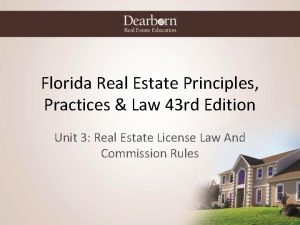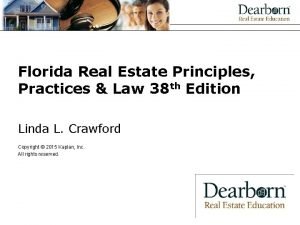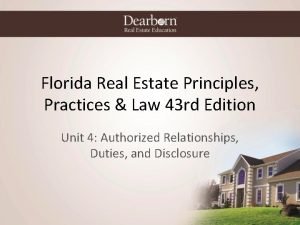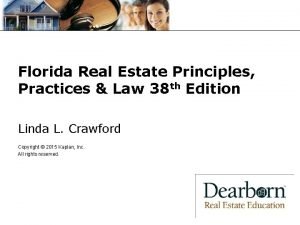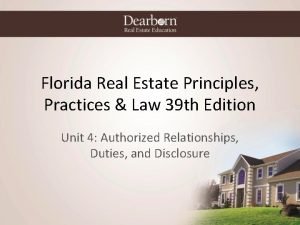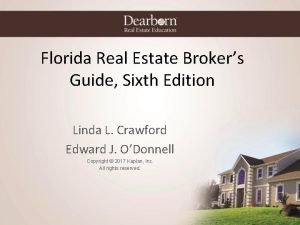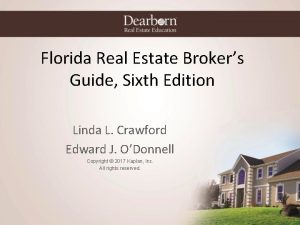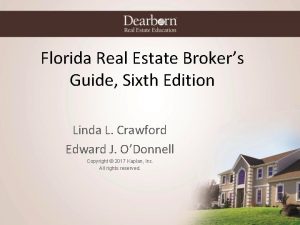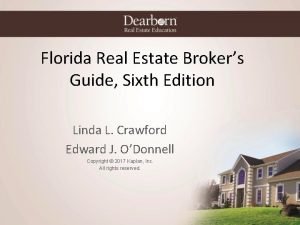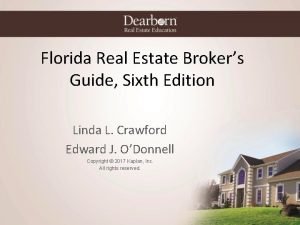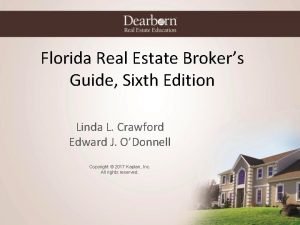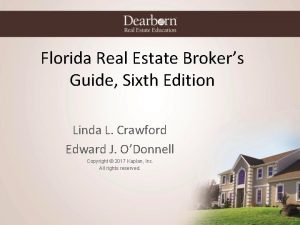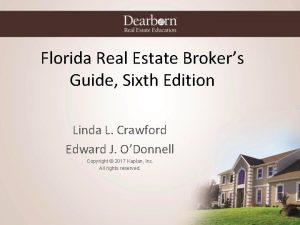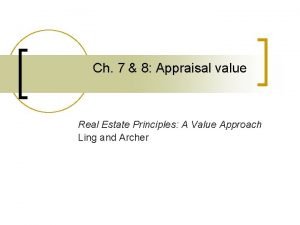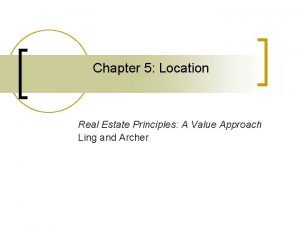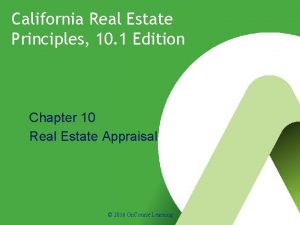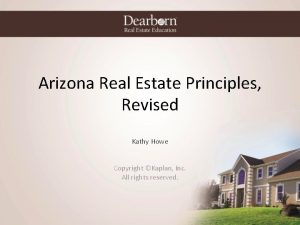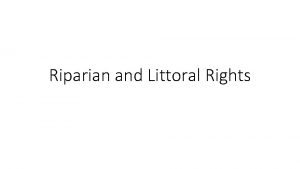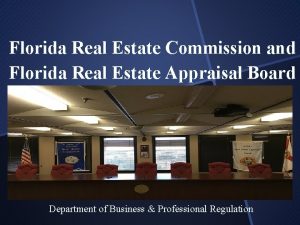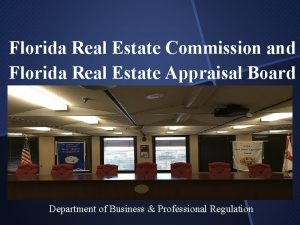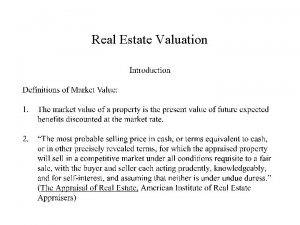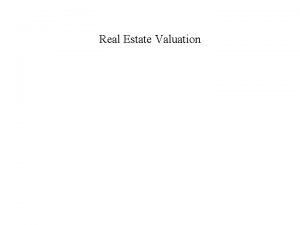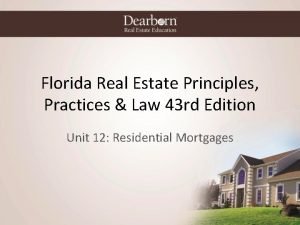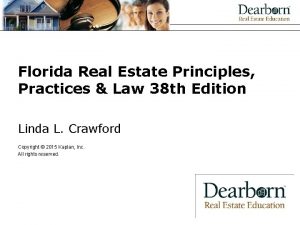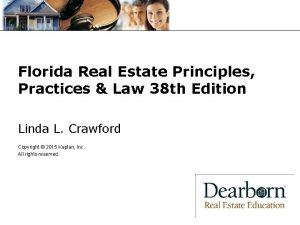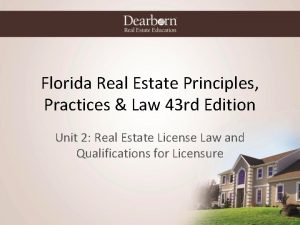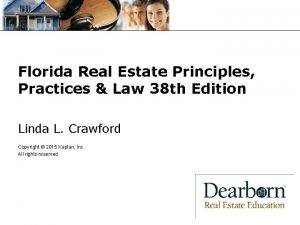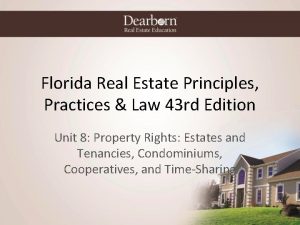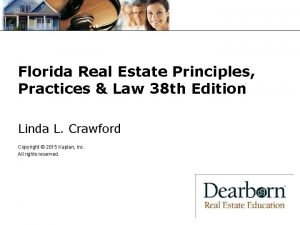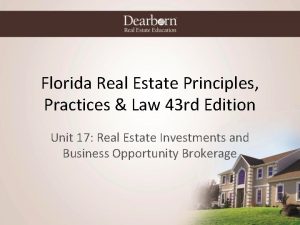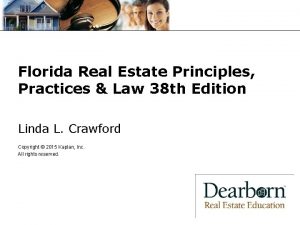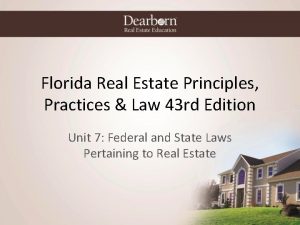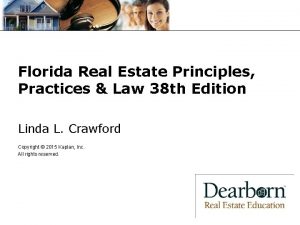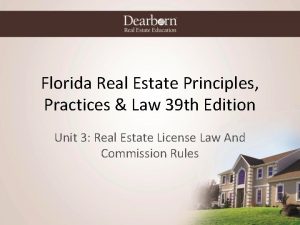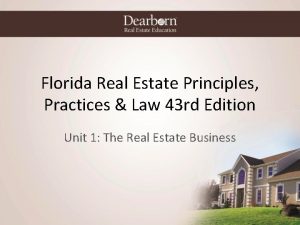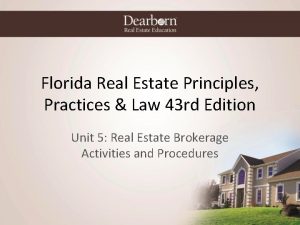Florida Real Estate Principles Practices Law 43 rd
































- Slides: 32

Florida Real Estate Principles, Practices & Law 43 rd Edition Unit 9: Title, Deeds, and Ownership Restrictions

Legal vs. Equitable Title • Legal Title – A legal concept signifying ownership to the collection of rights called a freehold estate • Fee simple estate • Life estate • Equitable title – The interest that implies a person will receive legal title at a future date; the interest that a buyer receives upon executing a contract prior to title closing © 2017 Kaplan, Inc.

Acquiring Legal Title • Alienation – Act of transferring ownership, title, or an interest in real property • Alienation may be – Voluntary—with the owner’s control and consent – Involuntary—without owner’s control and consent © 2017 Kaplan, Inc.

Transfer by Voluntary Alienation • Deed – A written instrument used to convey an interest in real property – Conveys legal title • Will – Died testate • Deceased person prepared will before death – Testator (testatrix) • Person who leaves a will • Real property transferred to the devisee © 2017 Kaplan, Inc.

Transfer by Involuntary Alienation • Descent – When person dies without leaving a will (intestate) property descends to heirs • Escheat provides for government to take property of owner who dies intestate and has no known heirs • Adverse possession when the true owner sleeps on owner’s rights • Eminent domain gives government power to take property for public purpose through legal process called condemnation © 2017 Kaplan, Inc.

Conditions for Adverse Possession Hostile possession Open possession Taxes paid by adverse possessor Claim of title Adverse possession for 7 years Notorious and flagrant public possession © 2017 Kaplan, Inc.

Notice to Legal Title • Actual – Direct knowledge acquired in the course of a transaction (witnessed) • Constructive (legal notice) – Recording document in the public records – Acknowledgment • Formal declaration before a notary public by grantor that the signing is a free act © 2017 Kaplan, Inc.

Protection of Title • Chain of title is complete successive history • Abstract of title – Condensed report of title search found in public records • Title opinion – Executed by an attorney who has studied the abstract – Whether title is marketable – Usually not guaranteed © 2017 Kaplan, Inc.

Title Insurance • Contract that protects policyholder from losses from defects in title • Florida does not require title insurance • Licensees are not qualified to give opinion of title – Advise parties to contact attorney or title company • Licensees first must obtain a current opinion from an attorney before quoting an opinion that title is good © 2017 Kaplan, Inc.

Title Insurance • Owner’s policy – – Issued for purchase price Protects new owner and owner’s heirs Not transferable to another owner One-time premium • Lender’s policy – – – Issued for unpaid mortgage amount Protects lender against title defects Transferable (assignable) Protects lender up to outstanding loan balance Most lenders require as a condition of making loan One-time premium © 2017 Kaplan, Inc.

Deeds • A written instrument that conveys title • Two parties to a deed – Grantor – owner giving title – Grantee – new owner receiving title © 2017 Kaplan, Inc.

Parts of a Deed • • • Premises contains names of grantee and grantor Consideration—given in exchange for title Words of conveyance—Granting clause Interest (estate) being conveyed—Habendum clause Exceptions and reservations Deed restrictions Appurtenances Legal description Voluntary delivery and acceptance – Legal title passes to grantee at this point • Signature of competent grantor and 2 witnesses © 2017 Kaplan, Inc.

Requirements of a Valid Deed • • • In writing Names of grantor and grantee Grantor of legal capacity Consideration described Granting clause Habendum clause Legal description Signed by competent grantor and two witnesses Voluntary delivery and acceptance © 2017 Kaplan, Inc.

Statutory Deeds • Quitclaim deed – Grantor releases interest, if any – Grantor does not warrant title – Provides least protection for grantee – Granting clause only – Used to clear clouds on title – Remise, release, and quitclaim © 2017 Kaplan, Inc.

Statutory Deeds • Bargain and sale deed – Granting, habendum and seisin clauses – Grantor does not promise to defend title; no future warranty – Conveys all the title the grantor has, but it does not protect grantee from clouds or claims on the title – Used foreclosure and tax sales © 2017 Kaplan, Inc.

Statutory Deeds • Special warranty deed – Grantor will only defend title during grantor’s ownership – Granting, habendum and seisin clauses – Grantor did nothing to encumber or cloud title during the grantor’s ownership © 2017 Kaplan, Inc.

Statutory Deeds • General warranty deed – Contains all covenants and warranties available – Covenants and warranties made • Granting, habendum and seisin • Quiet enjoyment—peaceful possession undisturbed by claims of title • Further assurance—grantor will deliver legal instrument if required • Warranty forever—to defend grantee’s title – Required if sale contract does not state type © 2017 Kaplan, Inc.

Special Purpose Deeds • Personal representative’s deed – Personal representative is appointed by will or by court to settle estate of deceased person • Guardian’s deed – Guardian acts on behalf of a minor • Committee’s deed – Used when owner is legally incompetent • Tax deed – Used when property is sold for back taxes © 2017 Kaplan, Inc.

Government Restrictions • Police power – Broadest power of government to limit property owner rights, includes • Zoning ordinances, building codes, health ordinances • Eminent domain – Taking for just compensation – Condemnation process • Taxation – Property taxes at state level © 2017 Kaplan, Inc.

Private Restrictions • • Deed restrictions Easements Leases Liens © 2017 Kaplan, Inc.

Deed Restrictions • Deed restrictions are part of a deed – Affect only one particular property • Restrictive covenants often recorded with the plat map – Affect all the properties in a subdivision © 2017 Kaplan, Inc.

Easements • Right to use portion of owner’s land for a specific purpose • Does not convey ownership (possession) © 2017 Kaplan, Inc.

Types of Easements • Easement Appurtenant – Involves adjacent parcel of land • Easement In Gross – Benefits individual or business entity • Easement By Prescription – 20 years open, continuous, uninterrupted use • Easement By Necessity – Landlocked © 2017 Kaplan, Inc.

Encroachment • Unauthorized use of another’s property – Fence or garage located beyond boundary – Implied easement after seven years © 2017 Kaplan, Inc.

Leases • Grants right of possession and use to lessee (tenant) – Does not transfer ownership interest • Must be written and signed to be enforceable if over one year – Also requires signatures of two witnesses if over one year • Licensees may use fill-in-the-blank lease forms approved by FL Supreme Court © 2017 Kaplan, Inc.

Types of Leases • Gross lease – Tenant pays fixed rent • Net lease – Tenant pays fixed rent plus building expenses • Percentage lease – Tenant pays rent based on gross sales received • Variable lease – Tenant pays specified rent increased at set dates • Ground – Lease on land © 2017 Kaplan, Inc.

Assignment and Sublease • Assignment – When tenant assigns all of leased property for remainder of lease • Sublease – Two ways to sublet property • Tenant assigns a portion of leased property • Tenant assigns all property for less than remaining term © 2017 Kaplan, Inc.

Liens • Right to have a debt satisfied by some property owned by the debtor • Lienholder (lienor) may have the property sold to pay the debt of the owner (lienee) • Liens are recorded in the public records (constructive notice) • Liens are encumbrances (other encumbrances include easements, deed restrictions, government regulations) © 2017 Kaplan, Inc.

Voluntary and Involuntary Liens • Voluntary – Mortgage – Vendor’s lien • Involuntary – Judgment liens – Tax liens – Construction liens © 2017 Kaplan, Inc.

General and Specific Liens • General – Judgment liens – IRS liens – Federal estate tax liens • Specific – Property tax liens – Special assessment liens – Mortgages – Vendor’s lien – Construction (mechanic’s) lien © 2017 Kaplan, Inc.

Lien Priority • Superior liens take priority ahead of other liens • Superior liens include – Property tax liens (January 1 each year) – Special assessment liens – Federal estate tax (at death) • Junior liens – Priority by recording date © 2017 Kaplan, Inc.

Junior Liens • Junior lien priority set by recording date – Mortgage liens – Judgment liens – Vendor’s liens – Income tax (IRS) liens • Construction lien exception to priority rule – Retroactive to date work was performed © 2017 Kaplan, Inc.
 Florida real estate principles practices and law download
Florida real estate principles practices and law download Involuntary inactive real estate license florida
Involuntary inactive real estate license florida Florida real estate principles practices
Florida real estate principles practices Florida real estate principles practices & law 43rd edition
Florida real estate principles practices & law 43rd edition Florida real estate principles practices & law
Florida real estate principles practices & law Florida real estate principles practices
Florida real estate principles practices Florida real estate broker's guide 6th edition
Florida real estate broker's guide 6th edition Florida real estate broker's guide
Florida real estate broker's guide Florida real estate broker's guide 6th edition
Florida real estate broker's guide 6th edition The no brokerage relationship notice must be disclosed
The no brokerage relationship notice must be disclosed Florida real estate broker's guide 6th edition
Florida real estate broker's guide 6th edition Florida real estate broker's guide 6th edition
Florida real estate broker's guide 6th edition Florida real estate broker's guide
Florida real estate broker's guide Florida real estate broker's guide 6th edition
Florida real estate broker's guide 6th edition Florida real estate broker's guide 6th edition
Florida real estate broker's guide 6th edition Southpointe village apartments fishers in
Southpointe village apartments fishers in Real estate principles a value approach
Real estate principles a value approach Rent real estate principles a value approach
Rent real estate principles a value approach Rent real estate principles a value approach
Rent real estate principles a value approach Manoj chatlani
Manoj chatlani Arizona real estate law book
Arizona real estate law book Crm software for real estate law
Crm software for real estate law Newton's first law and second law and third law
Newton's first law and second law and third law Si unit of newton's first law
Si unit of newton's first law Boyles law
Boyles law Constant of avogadro's law
Constant of avogadro's law Realtor elevator pitch example
Realtor elevator pitch example Kwueval
Kwueval Real estate stakeholders
Real estate stakeholders Greek real estate market
Greek real estate market Sandy miller realtor
Sandy miller realtor Define littoral rights
Define littoral rights What are the 4 types of real estate
What are the 4 types of real estate
